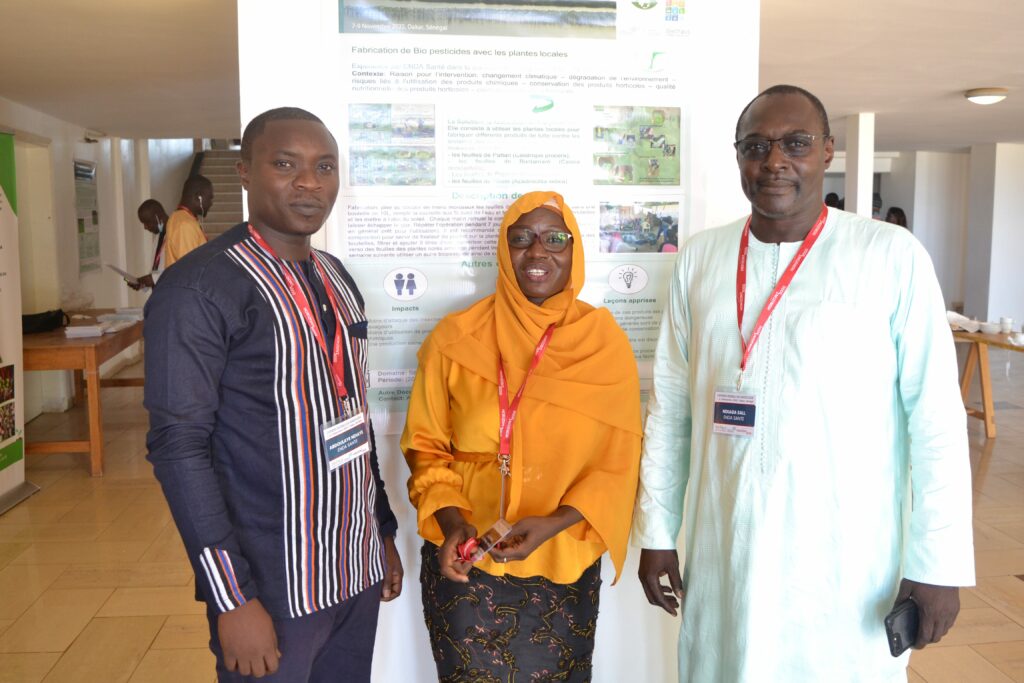Make Your Experiences Count. They Can Change the World.
LET’S BRING ALL OF OUR KNOWLEDGE AND EXPERIENCES TOGETHER.
TOGETHER WE KNOW MORE. TOGETHER WE ACHIEVE MORE. TOGETHER WE DO BETTER.
LET’S BRING ALL OF OUR KNOWLEDGE AND EXPERIENCES TOGETHER.
TOGETHER WE KNOW MORE. TOGETHER WE ACHIEVE MORE. TOGETHER WE DO BETTER.
Published: February 6, 2023
Retrouvez la version française ci-dessous (ou téléchargez-la au format PDF ici).
We came to this conference to promote an agroecology that includes grassroots actors. We want to make agroecology a reality, not only in Senegal, but in all of Africa.
– Ndiaga Sall, Project Manager of ENDA Santé – partner organisation of HORIZONT3000

HORIZONT3000 Senegal organised a regional conference on agroecology with participants from Senegal, Burkina Faso and Togo in Dakar, Senegal, from 7-9 November 2022. The conference was financed by the Liechtenstein Development Service, the Austrian Development Agency and Welthaus Graz.
For 3 days, challenges in this field were discussed together with the partner organisations of HORIZONT3000, participants from various civil society organisations (ENDA Pronat, RIKOLTO, ECLOSIO, AREJ, RAFIA, SOLIDAR Suisse Burkina Faso etc.), umbrella organisations (DyTAES, FENAB), scientific institutes (ISRA, IPAR), but also government representatives from the Ministries of Agriculture, Rural Equipment and Food Sovereignty, as well as of Environment, Sustainable Development and Ecological Transition.
The participants shared good practices and experiences in agroecology to promote agroecology as a response to the impacts of the climate catastrophe. The learnings of these experiences were summed up on informative posters. We selected and translated four of them. Click on following links to learn more:
At the end of the conference, a memorandum was produced with civil society engagements and recommendations directed to the ministries.
Nous sommes venus à cette conférence pour promouvoir une agroécologie qui inclut les acteurs de base. Nous voulons faire de l’agroécologie une réalité, non seulement au Sénégal, mais dans toute l’Afrique.
– Ndiaga Sall, Chef de projet d’ENDA Santé – organisation partenaire de HORIZONT3000

HORIZONT3000 Sénégal a organisé du 07 au 09.11.2022 une conférence régionale sur l’agroécologie, avec des participants du Sénégal, du Burkina Faso et du Togo à Dakar, Sénégal. La conférence a été financée par le Service liechtensteinois de développement, l’Agence autrichienne de développement et Welthaus Graz.
Pendant 3 jours, les défis dans ce domaine ont été discutés avec les organisations partenaires d’HORIZONT3000, des participant:es de différentes organisations de la société civile (ENDA Pronat, RIKOLTO, ECLOSIO, AREJ, RAFIA, SOLIDAR Suisse Burkina Faso, etc,) organisations faîtières (DyTAES, FENAB), des instituts scientifiques (ISRA, IPAR), mais aussi des représentants de l’État des ministères de l’Agriculture, de l’Équipement rural et de la Souveraineté alimentaire ainsi que de l’environnement et du développement durable et de la transition écologique.
Vous pouvez télécharger les présentations de la conférence ici :
Téléchargez le rapport général ici.
Les participants ont partagé leurs bonnes pratiques et leurs expériences en agroécologie afin de promouvoir l’agroécologie comme réponse aux impacts de la catastrophe climatique. Les enseignements de ces expériences ont été résumés sur des posters informatifs. Nous avons sélectionné et traduit quatre d’entre elles. Cliquez sur les liens suivants pour en savoir plus :
A l’issue de la conférence, un mémorandum a été produit avec les engagements de la société civile et les recommandations adressées aux ministères.